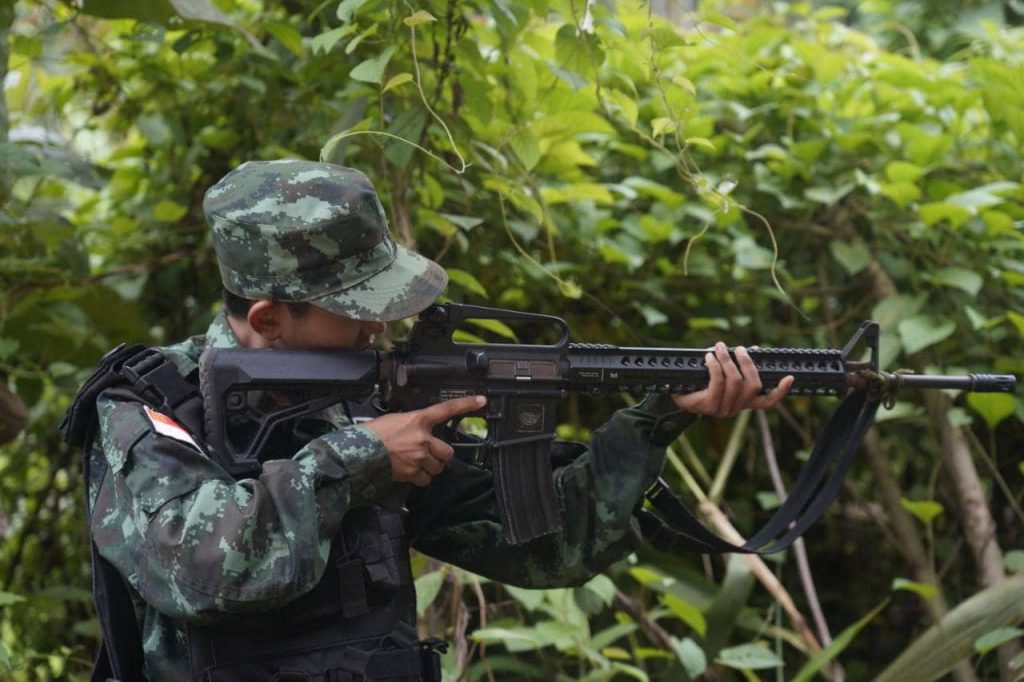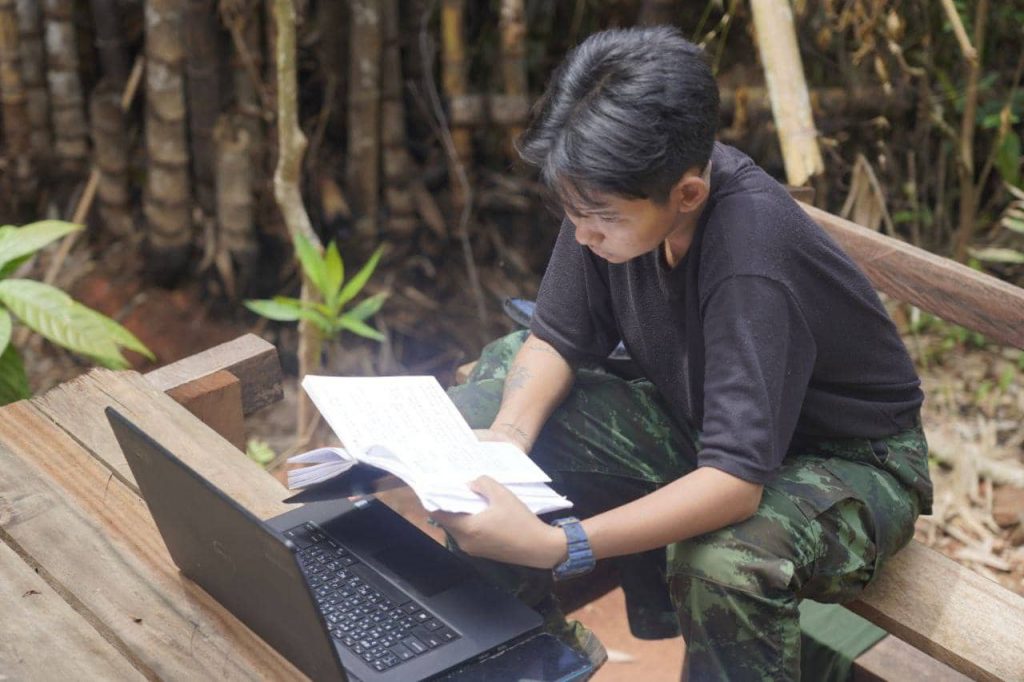Honest Information (HI)
Women have been shunned from politics and the military in Myanmar, where conservative beliefs are widely accepted by every previous generation as the second sex.
During the Spring Revolution, armed women testified that this was a discriminatory idea. Their courage proves that women are not, in fact, non-military.
A Kyi said, “Women may be anatomically fragile, but they can do the same as men in military training.
Now women are on every battlefield.”
A kyi, a 20-year-old engineering student at the Burmese People’s Liberation Army (BPLA) Basic Military Training, is an award-winning female sharpshooter.
She won this award among over a hundred trainees, especially men.
This is also a good enough opportunity to refute gender stereotypes and discrimination.
A Kyi commented, “I received this prize after competing against a man who scored the same as I did. I am honored to be able to show the ability of women.”
Winning a sharpshooter prize among males as a female warrior is no easy feat. She took the most effortful training, required the same blood and sweat as men, and became accustomed to big weapons.
After the military seized power, people who did not accept the coup staged a peaceful protest.
But with the military junta’s violent crackdown, young people from all walks of life have left their parents’ homes and gone to ethnic armed groups to learn military skills to root out the dictator.
Women have been involved in the spring revolution on an equal footing with men, as women commandos, guerrilla soldiers, and snipers.
A Kyi who aspired to become an engineer loved to write poetry and read before the coup. She is a native of Monywa at Sagaing, where there has been a heavy war between the Military junta and local PDF.
She said her dreams were thwarted following the coup, and she unexpectedly revolted with the armed forces.
“The first step is a peaceful protest of our demand. When the SAC cracked down, the protester could not continue peacefully. We decided to take up arms because we knew we had to fight,” she said.
When the second of three siblings, A Kyi, opted to join the armed forces, her parents, who had joined the civil disobedience movement, were only concerned for her safety and did not intervene.
A Kyi journeyed alone several miles through the forests and mountains for two nights and three days to learn military skills.
However, armed uprisings against the coup d’état occurred across the country, and she chose the BPLA because she admired the army’s commitment, loyalty, policies, and political ambitions.
A Kyi and women soldiers faced the first challenge when joining the army to build her own shelter, from chopping the bamboo and wood to roofing the house.
They experienced the same mental and physical stress as men throughout military training because they undertook nonstop exercise from 4:30 a.m. to 9:00 p.m like men.
In Addition, They cooked the meal themselves to survive on the battlefield wherever they went.
Their lunch breaks are only 3 to 5 minutes long as a soldier, and they’ve learned to fight for three days without food, depending on the situation.
Fish pastes, banana stems, and imitation meat were regular lunches. Sometimes, they also have a meat-based lunch: at the graduation.
And they drink and utilize pure brown water because there is no clean water.
Raw rice is the most common meal, and each individual is limited to 4 to 5 little pieces of dried fish. For their illness, they only have one Biogesic tablet to share.
Men and women have the same strenuous training, but women are more physically and mentally exhausted. And they are more tired during their menstrual cycle.
In this situation, A Kyi received the sharpshooter award and the non-use of sick leave award.
However, she commented, “training is hell! it is a real hell!”
Her future vision is to win the revolution first and then form a federal union to avoid another coup.
“This is the only path to the federal union that we are attempting to follow,” she said.
Women have served alongside men as trainers, administrators, and in several roles in the revolutionary forces that would depose the male chauvinist army.
The BPLA not only employs women to command the army but also LGBT.
“May” is the BPLA’s military trainer and camp commander. She aspired to be a photo model. She was a health volunteer and a preschool teacher before the coup.
May, a Rangoon native, joined the armed uprising despite her parents’ blockade.
She rested as a trainer after the trainees had slept. Every night, she checked the night guards and joined the meeting, and woke up before the trainees.
Therefore, being diligent and courageous is not only enough to become a trainer. She must be able to withstand extreme exhaustion and be healthy and strong.
May is the only female trainer in BPLA.
May said, “I have never seen a male student make fun of me. I try to live as much as to gain their respect. Sometimes, I let them, and sometimes, I restrict them. I have to try to be a role model.”
The women warriors from BPLA said they aren’t currently on the battlefield. But they are ready to deploy at any time.
May said taking the armed uprising is so life-threatening and exhausting. So if you don’t have the spirit of armed struggle, don’t come. However, we are welcome if you have.
Khaing(20) is the officer of the administrative office at BPLA. She also argued these words that women aren’t involved in a war, incompetent to fight. This is an ingrained and stereotypical idea and needs to be uprooted.
She strongly advocated for the revolution against being labeled as the second sex and being exposed to gender-based discrimination and harassment.
She said gender-based oppression is the root of all oppression. And we need to figure out how to reduce discrimination academically and informally.
Women’s segregation is a legacy of male chauvinism that pervades our society. Since I was born a woman, I have been part of a gender revolution, she described.
She desired to live in peace by planting. She is interested in language and literature. But the coup turned her life upside down. The day of the coup was her first intern day in a business.
Khaing said, “Six days after the coup, she joined the strike line with the student union. Since the coup d’état started trying to arrest the student with the warrant, she left her family until today. I don’t want any child, not only my niece, to feel such nonsense. I decided to armed”
Some of her friends prevented her not to joining the armed force, but she courageously made her decision.
She said, “This revolution is no longer an issue that can only be resolved orally. It’s something to hold on to and believe in. If we haven’t made ourselves clear. If we don’t know what we want, this coup will end unknowingly as before.”
She always thinks about eliminating all of the oppression daily in our community. She was angry whenever she saw oppressiveness.
Therefore, she didn’t accept any point of discrimination idea against women. She will fight that in this revolution, she said.
Khaing said, “this revolution is an opportunity. It is an opportunity to uproot the filthy evils; not only the military dictator but also the bad ideas and practices ingrained in our society.”




